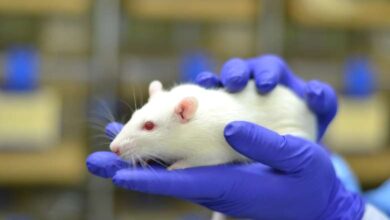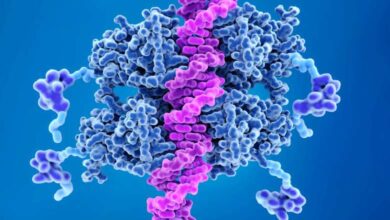
- Researchers have developed a 100% effective mRNA-based vaccine against deadly bacteria. The study showed that all animals treated with the vaccine were safeguarded against the bacteria. The novel technique can provide a pathway for the rapid development of safe and effective mRNA vaccines in the event of a bacterial pandemic.
For the first time ever, researchers from Tel Aviv University and the Israel Institute for Biological Research have developed an mRNA-based vaccine that is 100 percent effective against a bacterium that can kill humans.
In an animal model, the study revealed that all animals treated were completely safeguarded against the bacteria. The researchers suggest that their novel technology can facilitate the swift creation of potent vaccines for bacterial diseases, including those caused by antibiotic-resistant strains, in case of a sudden widespread outbreak.

Dr. Edo Kon from Tel Aviv University and Prof. Dan Peer, the VP for R&D and Head of the Laboratory of Precision Nano-Medicine at the Shmunis School of Biomedicine and Cancer Research led a study in collaboration with researchers from the Israel Institute for Biological Research: Dr. Yinon Levy, Uri Elia, Dr. Emanuelle Mamroud, and Dr. Ofer Cohen. The findings were recently published in Science Advances journal.
“mRNA vaccines like the ones used for COVID-19 were previously thought to only be effective against viruses and not bacteria. However, these vaccines have a significant advantage in that they can be developed quickly. For example, it only took 63 days from the publication of SARS-CoV2’s genetic sequence to begin clinical trials for COVID-19 vaccines. Until recently, scientists believed that developing mRNA vaccines for deadly bacteria was impossible. However, our study has shown that it is indeed possible to create 100% effective mRNA vaccines for such bacteria”, said Edo Kon.
The researchers have explained that viruses require host cells to replicate. By inserting their own mRNA molecule into human cells, viruses use these cells as a factory to produce viral proteins based on their genetic material, essentially making copies of themselves. In mRNA vaccines, this same molecule is created in a laboratory setup and packaged in lipid nanoparticles resembling human cells’ membranes. Once injected into the body, these lipids attach to our cells, causing them to produce viral proteins. As the immune system becomes familiar with these proteins, it learns how to protect the body in case of exposure to the virus.
According to Kon, the production of proteins varies between viruses and bacteria. Viruses utilize our cells to create their own proteins according to their genetic makeup, resulting in protein translations comparable to those generated from artificially synthesized mRNA in a laboratory setting. Conversely, bacteria do not rely on human cells for protein synthesis. The evolutionary paths of humans and bacteria diverge significantly, leading to variations in the types of proteins produced by each organism even if they share identical genetic sequences.
For scientists, creating vaccinations to combat bacterial illnesses is proving to be a challenging issue. They are working hard to design bacterial proteins that can trigger the human immune system effectively. Attempts made in the past to produce these proteins inside human cells have failed as they did not generate enough antibodies and were unable to provide adequate protection to the immune system. One reason for this is that when produced in human cells, these proteins undergo significant changes such as sugar additions which alter their composition and reduce efficacy. To overcome this issue, researchers have developed new techniques for secreting bacterial proteins through alternative pathways resulting in a stronger immune response. They also improved the stability of the protein by adding a section of human protein. These innovative strategies have led to breakthroughs in vaccine development, yielding full immunity against bacterial infections.
Professor Peer states that there exist several pathogenic bacteria without any vaccines, and the excessive use of antibiotics has led to drug resistance among many bacterial strains. Antibiotic-resistant microorganisms are becoming a major health concern all over the globe. In response to this global problem, the team developed an mRNA vaccine which was tested on animals infected with a deadly bacterium. All unvaccinated animals died within a week, while the vaccinated animals remained healthy. Notably, in one of the vaccination methods, full protection was achieved with just one dose, which is crucial for protection against fast-spreading bacterial pandemics. It is worth noting that the COVID-19 vaccine was developed quickly due to previous research on mRNA vaccines for similar viruses. This study provides a pathway for the rapid development of safe and effective mRNA vaccines in the event of a bacterial pandemic.





